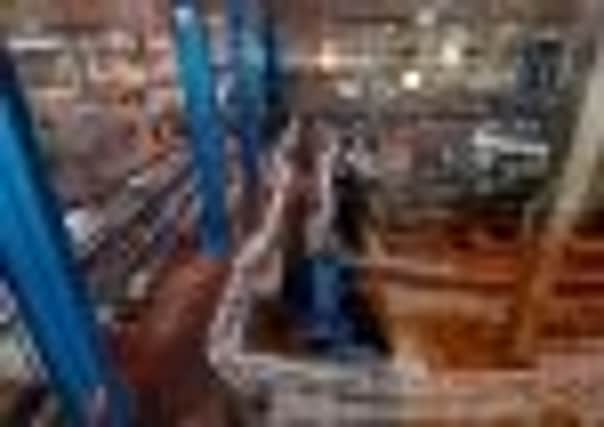CCE warns of threats facing future sales


The firm, which has its main UK factory in Wakefield, outlined how it could be hit by “real or imagined” concerns over product quality.
The world’s third‑largest independent Coca‑Cola bottler achieved a boost, however, as wholesale and retail demand helped push up sales three per cent to £1.668bn.
Advertisement
Hide AdAdvertisement
Hide AdCCE is the only licensed bottler in Britain for products from The Coca-Cola Company (TCCC), from whom it buys concentrates syrups.
Its parent company is headquartered in Atlanta in the US. Across Britain it has 4,500 staff, including Europe’s largest soft drinks factory in Wakefield, where 560 staff work in engineering, manufacturing, operations and distribution.
CCE made a pre-tax profit of £254.7m in 2010, up from £239.06m the previous year. Its return is driven not just by the manufacture, sale and distribution of Coca-Cola, Diet Coke and Coke Zero but also several other drinks including Fanta, Dr Pepper, Sprite and Schweppes.
In its report, directors explain at length the possible threats to its future performance, including TCCC not renewing a fixed-term licensing agreement, increased competition and further recession across Western Europe.
Advertisement
Hide AdAdvertisement
Hide AdThey go on to write: “Our success depends on our products having a positive brand image with customers and consumers. Product quality issues, real or imagined, or allegations of product contamination, even if false or unfounded, could tarnish the image of the affected brands and cause customers and consumers to choose other products...
“A significant product liability or other product-related legal judgement against us or a widespread recall of our products could negatively impact our business, financial results, and brand image.
“Additionally, adverse publicity surrounding obesity concerns, water usage, customer disputes, labour relations, product ingredients, and the like could negatively affect our overall reputation and our products’ acceptance by consumers, even when the publicity results from actions occurring outside our territory or control.”
The Coca-Cola brand faced embarrassment seven years ago when it withdrew Dasani, its ‘pure’ bottled water, after it was found to be contaminated with illegal levels of a chemical linked to cancer. Only weeks before it had emerged the source for Dasani was the mains supply to Coca-Cola’s factory in Sidcup, Kent.
Advertisement
Hide AdAdvertisement
Hide AdCCE has performed well over the last year, however, and uses its financial statements to state its long-term priorities – to be number one “or a strong number two” in every category in which it operates, to be its customers’ most valued supplier by improving efficiency and transforming its “go-to-market model”, and creating a “winning” culture by having a talented and diverse workforce.
Its accounts were filed at Companies House under British financial law. Most company accounts include a report on the risks facing the business.
Late last month parent company Coca-Cola Enterprises Inc reported higher-than-expected quarterly earnings, helped by volume increases and foreign currency translation.
Profit rose to $246m (£150.3m) from $199m (£121.6m) a year earlier. On a per-share basis, earnings were 74 cents. The company did not provide a comparable earnings-per-share figure for the year-earlier period.
Revenue rose to $2.41bn. Sales by volume rose 4.5 per cent.
Advertisement
Hide AdAdvertisement
Hide AdSubsidiaries of CCE Inc are also the exclusive bottlers of Coke for France, Monaco, Belgium, Luxembourg, Holland, Norway, and Sweden.
With 62 per cent of its sales in Europe, Coca-Cola Enterprises is one of the most exposed of all US companies to the region.
However, it said it had been somewhat immune to any negative impact on its European sales.
“What is striking is that the arbitrage of the consumer is in favour of our category, which is not high-priced, pretty affordable,” Hubert Patricot, president of the company’s European group, said in April.
Advertisement
Hide AdAdvertisement
Hide Ad“Despite the difficult economic environment, consumers continue to favour our category.”
Rolling off the production line
Coca-Cola Enterprises’ Wakefield plant was built in 1989 as a manufacturing and distribution centre for northern England.
It produces more than 100 million cases of product per year and houses one of the fastest two-litre production lines in the world, filling over 30,000 bottles per hour.
In a recent local media publication it wrote of intention to reduce the impact of packaging, to maximise the use of renewable, reusable and recyclable resources and to recover the equivalent of 100 per cent of its packaging.
Advertisement
Hide AdAdvertisement
Hide AdCCE has been hit by a series of industrial disputes, however.
Last year workers at the factory in Edmonton, North London, went on strike in a row over pay.
Last month Unite balloted members at CCE distribution centres in another pay row. A strike was planned but postponed, however, with a further announcement expected soon.